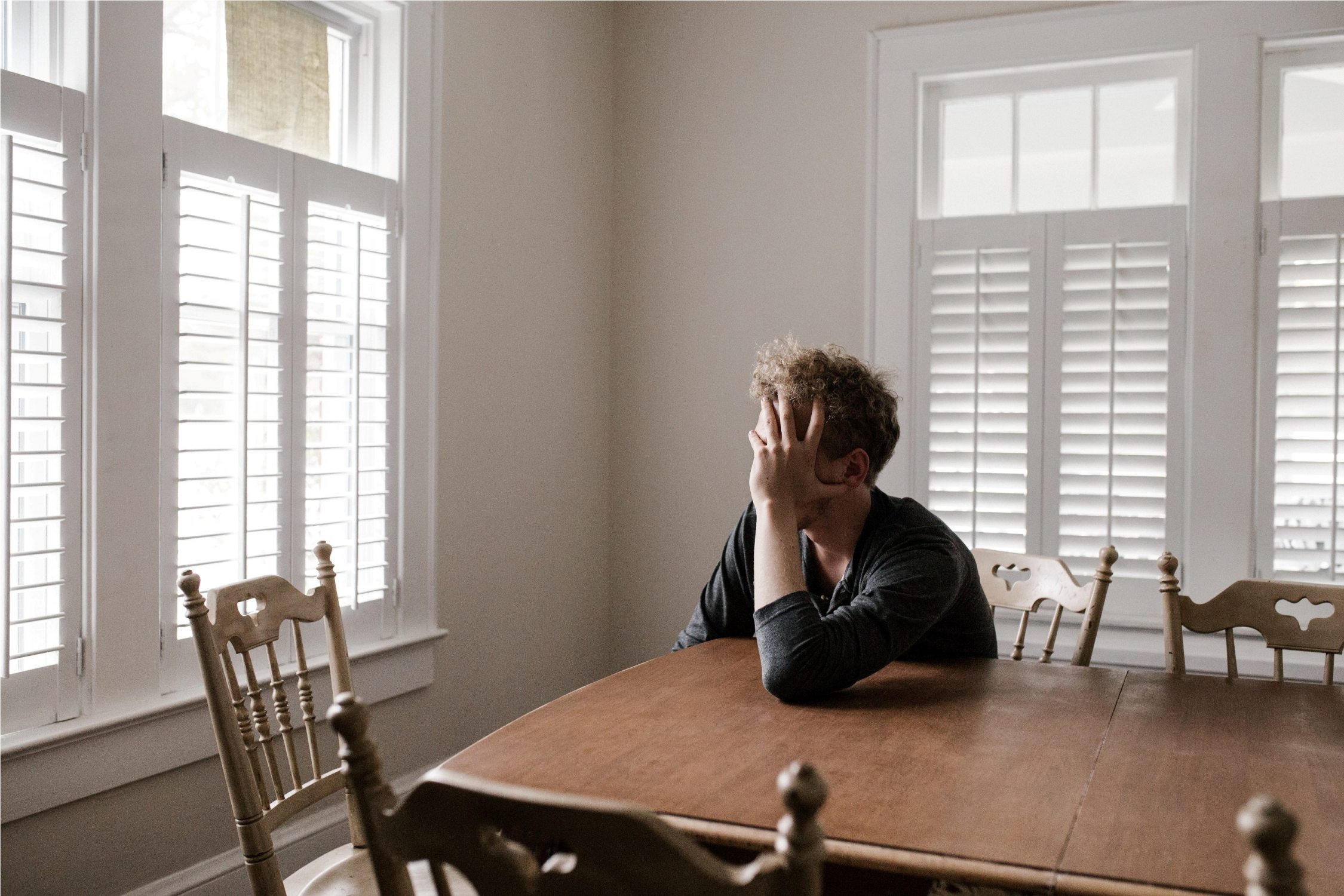Acknowledging one’s own experience of depression (or any other mental health issue for that matter) can be difficult for many individuals. It requires one to be brutally honest and admit vulnerability. This can be particularly true for men, whom society expects to be strong, silent, and unmoved. Any admission of emotions or internal hardship is a sign of weakness to be avoided at all costs.
 Most men do not feel safe to come out and acknowledge their struggle with mental health issues, especially depression. Adding to the complexity, the emotional experience of “sadness” is not the most common manifestation of male depression. Instead, men are much more likely to experience physical symptoms (e.g., headache, stomach problems), escapist behaviors, feelings of exhaustion, or anger.
Most men do not feel safe to come out and acknowledge their struggle with mental health issues, especially depression. Adding to the complexity, the emotional experience of “sadness” is not the most common manifestation of male depression. Instead, men are much more likely to experience physical symptoms (e.g., headache, stomach problems), escapist behaviors, feelings of exhaustion, or anger.
Thus, between the lesser-known symptoms and society’s demand that men be strong and emotionless, it is no surprise many men suffer from undiagnosed depression. It is up to men to transcend the traditional expectations of masculinity and to take responsibility for their vulnerability by actively seeking healing.
In our American culture, negative emotions are often seen as inappropriate or uninvited. Likewise, many Christians feel it is wrong to acknowledge any experience of depression. The assumption held is that if the joy of the Lord is ‘truly’ in their hearts, depression ought not to be present.
Surely Christians must always be upbeat and full of happiness! Yet the Scriptures are filled with lament and grief—humans encountering deep distress and discussing it with God. The Psalms speak volumes of humans trusting God while vocally expressing their suffering.
Though Jesus offers us freedom from our burdens, the freedom is the relationship with Him, not the absence of hardship. Indeed, Christ Himself promises that we will encounter hardship: “I have said these things to you, that in Me you may have peace. In the world you will have tribulation. But take heart; I have overcome the world” (John 16:33).
As long as we exist in these fallen bodies, Christians will continue to wrestle with sin and its effects on their lives. Depression is a product of the fall; but joy is a product, a fruit, of the Spirit. It is important to remember that the Spirit of God does not dwell up in the clouds, but dwells in us, His followers. When we feel the burdens of life, God offers us His peace and His joy in the Spirit.
 As the Scriptures teach, in the middle of our burdens and in the midst of the chaos, the Lord simply sets a table to eat and commune with us (see Psalm 23). The Lord woos us toward Him, setting the table with our favorite food (see Job 36:16). God invites us to Him in our pain. But we must realize that we are in pain. Freedom will require you to admit your human vulnerability, identify your burdens, and give them over to the work of the Spirit.
As the Scriptures teach, in the middle of our burdens and in the midst of the chaos, the Lord simply sets a table to eat and commune with us (see Psalm 23). The Lord woos us toward Him, setting the table with our favorite food (see Job 36:16). God invites us to Him in our pain. But we must realize that we are in pain. Freedom will require you to admit your human vulnerability, identify your burdens, and give them over to the work of the Spirit.
Identifying Depression in Men
The first step toward healing is recognizing there is a problem.
If you want to find healing for yourself and your family, you will need to acknowledge your struggle with depression.
Here are some of the key identifying symptoms of depression in men:
- Irregular, irritability, or anger
- Restlessness, anxiety, “feeling on edge”
- Disinterest in work, hobbies, or passions
- Weakened sexual desire or ability to perform sexually
- Hopelessness
- Inability to concentrate
- A sense of exhaustion
- Sleeping too much or too little
- Too little appetite or too much appetite
- Suicidal thoughts or attempts
- Physical pain (headaches, cramps, stomach problems)
- Unable to maintain work, family, and social responsibilities
- Engaging in high-risk activities
- Dependence or abuse of alcohol or drugs
- Increased emotional distance or isolation
Many of these symptoms would not necessarily lead one to conclude depression as its cause. Thus, it is important to carefully examine your life history, circumstances, and symptoms to determine whether depression could be a prominent reality in your life.
Common Types of Depression in Men
If you suspect that you or your loved one may be facing depression, it is important to determine what type of depression you are facing.
Below are four common types of male depression:
Minor Depression: This is the least severe form of depression. You will still experience the symptoms of depression, but they are not long-lasting and will appear less severe. Minor depression is often caused by life circumstances (e.g., losing a job, divorce, getting a difficult diagnosis)
 SAD (Seasonal Affective Disorder): This form of depression is brought on by the change in weather and lack of natural sunlight during winter. SAD is less tied to life circumstances and more related to the darker winter season. Alternatively, some individuals may experience depression in the hot summer season as well, spending excessive time indoors to escape the heat.
SAD (Seasonal Affective Disorder): This form of depression is brought on by the change in weather and lack of natural sunlight during winter. SAD is less tied to life circumstances and more related to the darker winter season. Alternatively, some individuals may experience depression in the hot summer season as well, spending excessive time indoors to escape the heat.
Persistent Depression: This form of depression is characterized by symptoms of depression lasting at least two years. These symptoms are less severe than symptoms of major depression.
Major Depression: This form of depression is characterized by severe symptoms that appear in depressive episodes. These episodes can last for weeks or months. Some only will experience one episode in their lifetime, while others will experience several.
The form of depression you are facing will determine the type of treatment you need. Those suffering from minor depression may experience positive results from minor behavioral changes, while those suffering from major depression may require more significant interventions with the help of a mental health professional.
Causes of Depression in Men
Depression can have a variety of causes in men. Seeking to overcome the negative effects of depression in your life will require you to examine your life with a fine-tooth comb. While each individual’s life story differs, the origins of the depression can be categorized into three common causes:
- Genetics: If depression runs in your family, then you may be predisposed to experience it throughout your life. For those with a family history, working with a professional counselor may be necessary because you will need an expert opinion to help move forward.
- Environmental Stress: What is happening around you can lead to depression. Losing your job, going through a divorce, or facing the death of a loved one can all produce depression. If you have experienced extreme hardship, you may suffer from depression as a byproduct.
- Sickness: Some forms of sickness can lead to depression. It is not uncommon for people diagnosed with diabetes, cancer, or Parkinson’s disease to experience some form of depression. If you already suffer from depression, then sicknesses like these can worsen the condition.
Treating Male Depression
 When treating depression, every case is different. Depending on your circumstances, symptoms, and form of depression, you will need to work with mental health professionals and medical physicians to configure mental health treatment plan that is right for you. Generally, these treatment plans include a combination of psychotherapy and medication. Though powerful in method, medication is not always a necessary addition to achieve positive results.
When treating depression, every case is different. Depending on your circumstances, symptoms, and form of depression, you will need to work with mental health professionals and medical physicians to configure mental health treatment plan that is right for you. Generally, these treatment plans include a combination of psychotherapy and medication. Though powerful in method, medication is not always a necessary addition to achieve positive results.
Medication
Antidepressants have been found to effectively treat those suffering from depression. There is a wide variety available, and you will need to consult with a medical professional to find which one is best for you. Each antidepressant comes with its own risks and side effects, but once you find one that is a good fit for, the benefits far outweigh the risks, in most situations.
Psychotherapy
Psychotherapy, or talk therapy, has been shown to effectively treat many types of depression. Meeting with a trained clinical mental health counselor can help you identify destructive and inefficient thinking patterns and behaviors and replace them with constructive and efficient thinking patterns and behaviors.
Psychotherapists generally take a particular perspective or a set of perspectives in their approach toward psychotherapy. Thus, it will be most beneficial for Christians to seek a trained professional mental health counselor who shares the Christian perspective.
A mental health counselor will be able to help you process difficult experiences in the past or present, teaching you to let go of pain and navigate your life in healthy more effective way.
It is important to know that for some, depression does not ever leave. But, it is equally important to know that for those few, psychotherapy and medication can greatly lessen your daily experience of it. It may take time, but it is more than possible to find lasting positive results—both for yourself and your family.
Be a Man
Being a man, a husband, or a father is not about pretending not to feel pain; being a man is about laying down your pride for your family. A cowardice man neglects himself to the destruction of others. Listen to the Spirit, He is always for you. If you are suffering from symptoms of depression, I encourage you to lay down your pride for the sake of your family and seek professional help today.
“Worried”, Courtesy of Pixabay, Pexels.com, CC0 License; “Dejected”, Courtesy of Andrew Neel, Pexels.com, CC0 License; “Headache”, Courtesy of Andrea Piacquadio, Pexels.com, CC0 License; “Couple Standing in the Field”, courtesy of Josh Willink, Pexels.com, CC0 License






